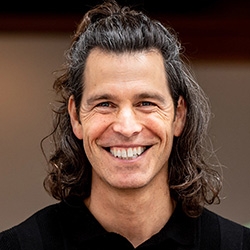

Search Results: empathy
-
When someone doesn't want to talk some options include releasing your attachment to the strategy you want, asking about and affirming with empathy their reasons for not talking, looking for what support could be helpful to shift to more openness, letting go, and grieving. Read on for more on this, including possible reasons for why they might not want to engage on it.
-
This exercise brings forth presence, awareness, and witnessing regarding what you observe. And also the inner form of experiencing: thinking, feeling, sensing, longing, and noticing any inner resistance. This exercise is designed to allow self-compassion to clear the inner space, and to help you feel it as a flow of energy, presence to the other, and bring in a more relaxed experience and more availability to vulnerability.
-
Here's guidance on how to approach your inner experience when triggered or stuck in a distressing life experience. Self-Compassion in life can be experienced as: "There is room for life experience in me. There is an open space for ‘what is’ to be fully present in my inner experience". This exercise is more about tracing your felt experience than verbalizing it.
-
Struggling to navigate needs between the vaccinated and unvaccinated during the COVID-19 pandemic? How can we disagree and still understand each other? Listen in as a participant engages with Miki about her struggle to choreograph people's divergent needs around vaccines, and enjoy Miki's tip for reflecting back understanding when we disagree!
-
For this exercise choose a situation in which you have said a “yes” to someone‛s request but you didn't experience your “yes” as given freely or joyfully. Then explore judgements, feelings, needs, and alternate strategies that come up in relation to your “yes”, your “no”, and in relation to what the other person might be experiencing.
-
In this exercise choose a situation in which you got a “yes” to your request but you are not confident that it was agreed to freely or joyfully. Then explore your response to their “yes”, and possible unexpressed "no", with related observations, judgements, feelings, needs, requests, and alternate strategies that come up.
-
Use this exercise to stay in dialogue and connect to needs while facing a “no”. Identify a situation where you have low confidence that you'll get your needs met, and it'll be hard hearing a “no” to your request. Explore your response to the “no” by working with feelings, needs, request and alternate strategies. Thus you can work towards meeting your needs while also releasing the idea that your needs “have to” be met.
-
This one page colour handout illustrates the focus options or intention options for connection: empathy (verbal and non-verbal), self expression, and self connection (opening our heart to self and/or others). It also offers some suggestions for how to say these things to self and others.
-
Because we affect one another it can be hard to know where to take responsibility and where to leave it with the other person. This means we need self empathy, and presence for another's struggles without compulsion to "make them happy" or bring them healthy change. You can then attend to the needs and to your choice about if and how you want to contribute with compassion. Respect them as autonomously in charge of their unique process of change. With this, you honor your life and theirs. And where, what, and how you will invest your precious life energy.
-
The word "privilege" signifies the benefit to the person having it, and the relationship between that person’s benefit and others' lack of benefit. When privileged, there are incentives to not see this interdependent link. For instance, it's easier for the wealthy to think of the poverty of many and the wealth of some are unrelated. If the wealthy want to keep wealth they would need to continue with approaches rooted in this separation.
-
How to get past the sting of a painful comment? Get empathy from self or another. Then connect with the commenter's feelings and needs. The more you can do this the less personally you may take it. Then work together on specific, do-able, authentic agreement about doing something differently next time, the kind that will enable you both to shift out of reactivity. Three things need to be in place for that to work.
-
Often making an apology is not enough because people want greater depth of understanding and empathy. Instead of judging ourselves or feeling guilt we can "mourn" what we did that stirred up pain in others. This can bring about a sweet pain that leads to change. Then we can ask ourselves what we can do next time and make a commitment to do this and/or offer a regrets to the person expressing feelings and needs.
-
Amidst the Israel/Palestine war we see polarizing media portrayals and the battle for public opinion. Read how one person shares his deep, personal connections to the Israel/Palestine conflict, expresses the trauma and viewpoints of both Palestinian and Israeli experiences -- in a way that aims to transcend polarizations, hold compassion, and understand the complexity on both sides. Despite the immense challenge that defies easy resolution, he holds hope, noting historical reconciliations such as the ones between Germans and Jews.
-
Communicating with a client or patient with a mental health diagnosis can be tough. This guidebook introduces Nonviolent Communication, helping you develop more clear, compassionate, mutual satisfaction and potentially create conditions that heal those who look to you for help. With this guide learn to notice when your approach is likely to trigger defense and how to shift that to more authenticity, understanding and trust.
-
Yoram Mosenzon shares an exercise and demo to explore the process of identifying observations and using judgements (jackals) to find the needs.
-
Shifting to a needs-based perspective is one of the most powerful—and challenging—aspects of integrating Nonviolent Communication (NVC) into daily life. In this short video, Mary Mackenzie offers three simple, practical tips to help you cultivate needs consciousness and transform how you experience your world and relationships.
-
Trainer Tip: NVC-based social change naturally emerges from “a certain kind of spirituality”, a quality of spiritual clarity. Intuitions and impulses arising from spiritual clarity are more likely to support sustainable systems. Read on for how to bring more of this in, and ways to transform your complaint into commitment.
-
- Celebrate and nurture your relationship to the Earth — and each other!
- Explore your connections to family, partner, work, nature, self and more
- Discover new ways to grow in community and work together to make this world a better place
- Engage and immerse yourself in NVC while making new friends!
-
Whether its pandemics, climate change, damage to the environment or other massive challenges that humanity faces, what are we to do if we can't agree on even the most basic information and knowledge? From empathic understanding we can focus on shared, universal human needs (where there is no conflict or disagreement) underlying our perceptions, and feelings. Then we can see if there are ways we can agree on to meet those needs.
-
Kelly shares how freedom and autonomy create strong, healthy, and loving relationships.
Quick Links

Stay in Touch!
We value your privacy, won't share your email address and you can easily unsubscribe any time.




















